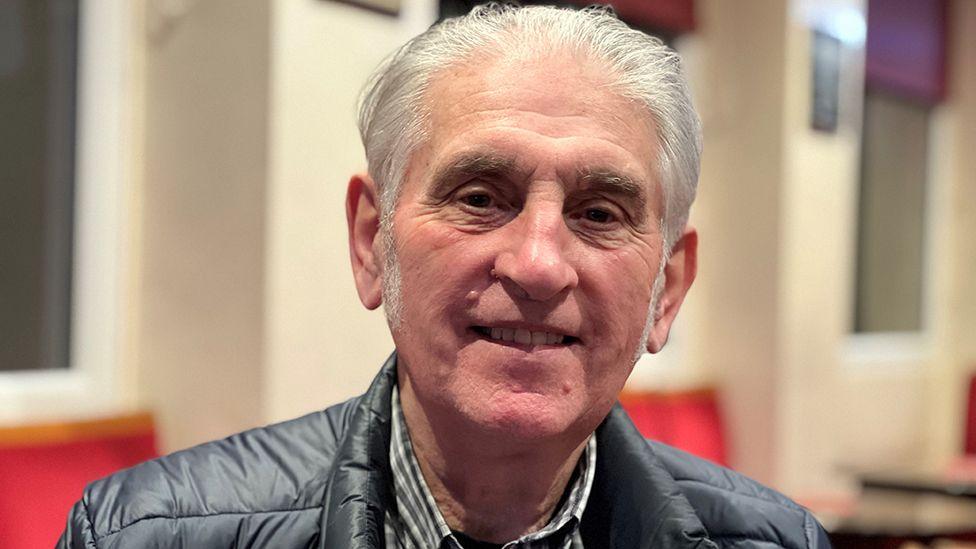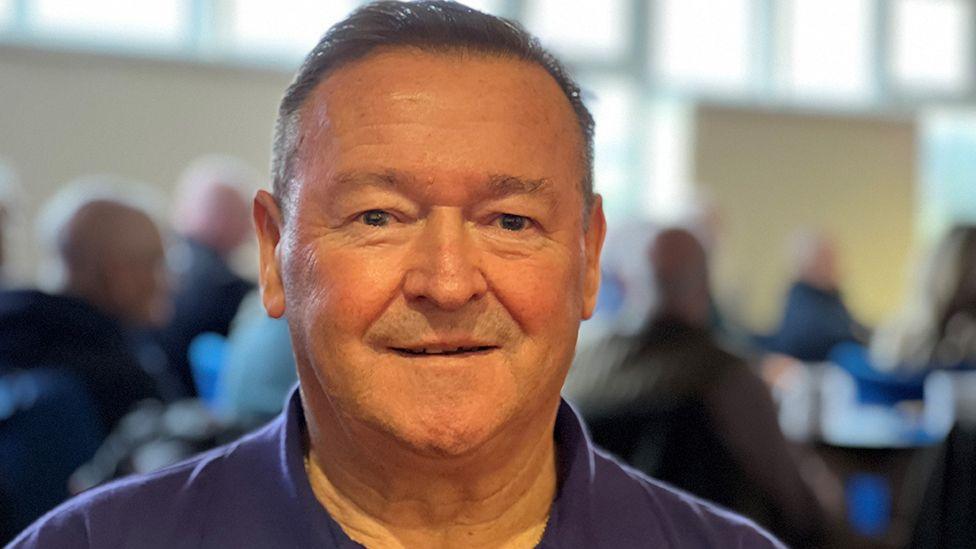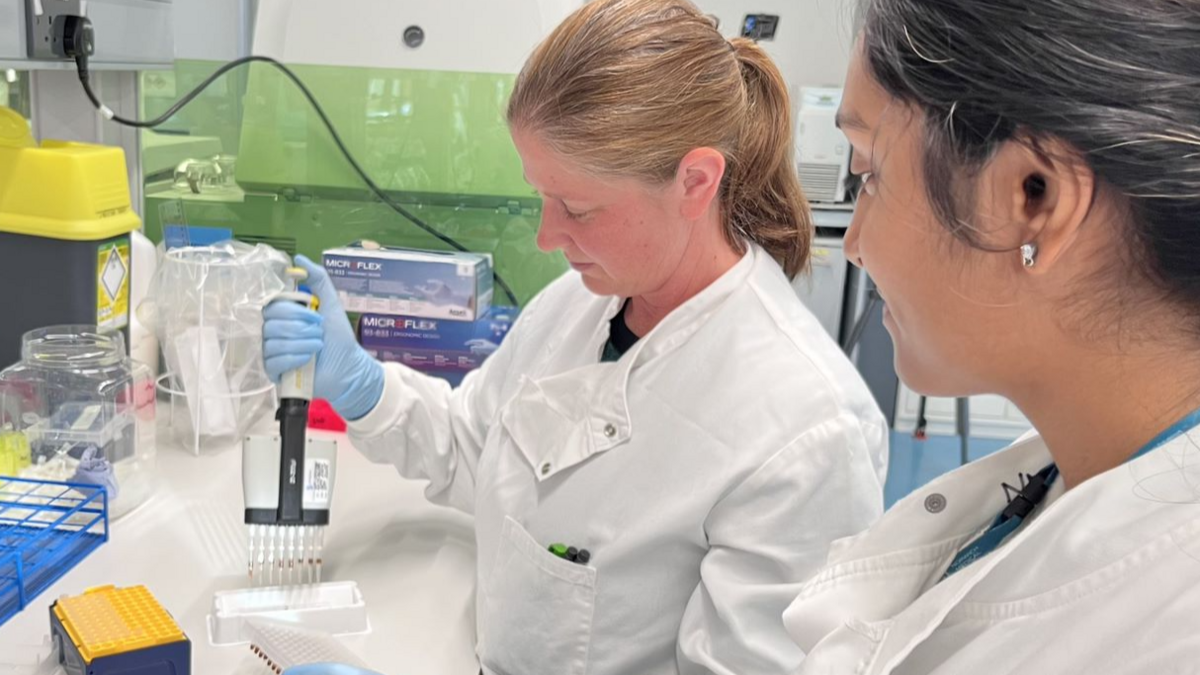Men's lives 'at risk' due to screening test issues

Graham Lindow says everyone at the support group knows everyone else by their first names
- Published
A cancer support group says men's lives are being put at risk because they cannot easily access a key screening test.
The Furness Prostate Cancer Support Group in Barrow, Cumbria, claims some local GPs are reluctant to give the PSA blood test, which can detect prostate cancer, unless men have symptoms.
The Consortium of Lancashire and Cumbria Local Medical Committees (LMC), which represents GPs, says they take early cancer detection "extremely seriously".
Meanwhile, the body which commissions healthcare says it will work to "improve our offer" to men in the area.
The support group helps men on the Furness Peninsular going through treatment, or who have been through it, and their families.
They joke it is the club no one wants to be in, but it provides invaluable support in difficult times.
Graham Lindow, who is 78 and has been going since 2020, says: "It's like joining an extended family - everyone provides support."
The group has been campaigning for the PSA blood test, which detects prostate cancer by measuring something called Prostate-Specific Antigen. A raised level can indicate cancer, although it can also point to benign conditions.
Support group committee member Ian Murray said: "We've got lots and lots of men that have been diagnosed at an earlier age in this area and yet we've still got GPs and GP surgeries that are saying 'you don't need it, you don't need a test, it's a waste of time'.
"The information we're getting with regards to men being turned away from GP surgeries – that's getting worse."

Support group committee member Ian Murray says the situation is getting worse
The test is not seen as completely reliable so there is no general screening programme like there is for breast cancer. It can miss the disease or give false positives.
But it remains one of the main tests to detect prostate cancer. The NHS says men over 50, even without symptoms, should be allowed it if, having had the pros and cons explained, external, they still want it.
The LMC said, although the PSA test can "play an important role" it was important to understand its limitations and potential pitfalls.
The test can be affected by non-cancerous conditions such as urinary tract infections and a positive result does not necessarily indicate prostate cancer, while a normal result does not always mean there is no cancer, it says.
"This can lead to unnecessary anxiety, further invasive tests or even missed diagnoses due to false reassurance," a spokesperson said.
"GPs and primary care clinicians will carefully consider the benefits and risks of PSA testing during consultations to ensure that individuals receive personalised, informed care.
"We encourage men to discuss any concerns about their prostate health with their GP."
'Being persistent'
When Sir Chris Hoy revealed his terminal cancer diagnosis in November there was an upsurge in men asking for the PSA test.
Sir Chris, who has a family history of prostate cancer, said he had no symptoms before the cancer reached a late, incurable, stage.
There is now a national campaign for men with a family history, and black men who are at greater risk, to be tested from the age of 45, even if they have no symptoms.
The government has said it is considering its response.
The Graham Fulford Charitable Trust, a national charity which campaigns for more PSA testing, says it has been contacted by men from all over the country.
"We get many calls every week saying could they have a test with us or could they get a home testing kit because their GP will not give them a test," chief executive Susan Hart says.
"Some areas are better than others and I think it depends on whether the NHS are under difficult pressure at the present time in that area."
The CancerCare charity, which covers the Morecambe Bay area, urges anyone worried about any type of cancer to go to their GP early.
"I think we know our bodies best, we know when something's not right," chief executive Alison Stainthorpe says.
"I think it's about going back and being persistent to ask for a doctor's appointment."

Sir Chris gave an emotional speech at the 2024 Sports Personality of the Year Awards
The Lancashire and South Cumbria Integrated Care Board, which commissions all healthcare for the area, says there is no screening programme for prostate cancer in England through the NHS but this is being reviewed.
New guidance is expected over the next two or three years, it says.
"In the meantime, GPs in Lancashire and South Cumbria should follow NICE and OHID guidelines regarding PSA testing for men without symptoms who request it," a spokesperson said.
"We are aware of reports that some GPs do not currently offer PSA tests to men without symptoms, but this is unlikely to be unique to Furness.
"The ICB is working with the local prostate cancer support group to improve our offer to men in Furness to ensure they receive well-evidenced care."
Follow BBC Cumbria on X, external, Facebook, external, Nextdoor and Instagram, external. Send your story ideas to northeastandcumbria@bbc.co.uk.
Related topics
- Published14 November 2024

- Published13 December 2024

- Published20 October 2021

